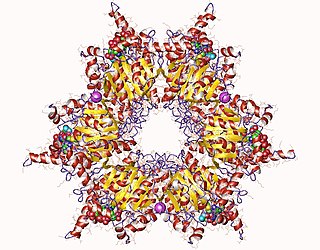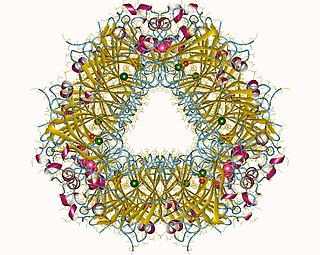
Methylmalonyl-CoA mutase is a mitochondrial homodimer apoenzyme that focuses on the catalysis of methylmalonyl CoA to succinyl CoA. The enzyme is bound to adenosylcobalamin, a hormonal derivative of vitamin B12 in order to function. Methylmalonyl-CoA mutase deficiency is caused by genetic defect in the MUT gene responsible for encoding the enzyme. Deficiency in this enzyme accounts for 60% of the cases of methylmalonic acidemia.
Carboxy-lyases, also known as decarboxylases, are carbon–carbon lyases that add or remove a carboxyl group from organic compounds. These enzymes catalyze the decarboxylation of amino acids, beta-keto acids and alpha-keto acids.

Oxaloacetate decarboxylase is a carboxy-lyase involved in the conversion of oxaloacetate into pyruvate.
Propionyl-CoA is a coenzyme A derivative of propionic acid. It is composed of a 24 total carbon chain and its production and metabolic fate depend on which organism it is present in. Several different pathways can lead to its production, such as through the catabolism of specific amino acids or the oxidation of odd-chain fatty acids. It later can be broken down by propionyl-CoA carboxylase or through the methylcitrate cycle. In different organisms, however, propionyl-CoA can be sequestered into controlled regions, to alleviate its potential toxicity through accumulation. Genetic deficiencies regarding the production and breakdown of propionyl-CoA also have great clinical and human significance.
Carboxylation is a chemical reaction in which a carboxylic acid is produced by treating a substrate with carbon dioxide. The opposite reaction is decarboxylation. In chemistry, the term carbonation is sometimes used synonymously with carboxylation, especially when applied to the reaction of carbanionic reagents with CO2. More generally, carbonation usually describes the production of carbonates.

In enzymology, a methylmalonyl-CoA carboxytransferase is an enzyme that catalyzes the chemical reaction
The enzyme 4-hydroxybenzoate decarboxylase (EC 4.1.1.61) catalyzes the chemical reaction

The enzyme aminocarboxymuconate-semialdehyde decarboxylase (EC 4.1.1.45) catalyzes the chemical reaction

In enzymology, an aspartate 4-decarboxylase (EC 4.1.1.12) is an enzyme that catalyzes the chemical reaction
The enzyme gallate decarboxylase (EC 4.1.1.59) catalyzes the chemical reaction
In enzymology, a glutaconyl-CoA decarboxylase (EC 7.2.4.5) is an enzyme that catalyzes the chemical reaction

In enzymology, an oxalate decarboxylase (EC 4.1.1.2) is an oxalate degrading enzyme that catalyzes the chemical reaction
The enzyme protocatechuate decarboxylase (EC 4.1.1.63) catalyzes the chemical reaction
The enzyme sulfopyruvate decarboxylase (EC 4.1.1.79) catalyzes the chemical reaction
The enzyme tyrosine decarboxylase (EC 4.1.1.25) catalyzes the chemical reaction
Malonyl-S-ACP decarboxylase (EC 4.1.1.87, malonyl-S-acyl-carrier protein decarboxylase, MdcD/MdcE, MdcD,E) is an enzyme with systematic name malonyl-(acyl-carrier-protein) carboxy-lyase. This enzyme catalyses the following chemical reaction
Biotin-independent malonate decarboxylase (EC 4.1.1.88, malonate decarboxylase (without biotin), malonate decarboxylase, MDC) is an enzyme with systematic name malonate carboxy-lyase (biotin-independent). This enzyme catalyses the following chemical reaction
Biotin-dependent malonate decarboxylase (EC 4.1.1.89, malonate decarboxylase (with biotin), malonate decarboxylase) is an enzyme with systematic name malonate carboxy-lyase (biotin-dependent). This enzyme catalyses the following chemical reaction
The Na+-transporting Carboxylic Acid Decarboxylase (NaT-DC) Family (TC# 3.B.1) is a family of porters that belong to the CPA superfamily. Members of this family have been characterized in both Gram-positive and Gram-negative bacteria. A representative list of proteins belonging to the NaT-DC family can be found in the Transporter Classification Database.
In enzymology, a phenacrylate decarboxylase (EC 4.1.1.102) is an enzyme that catalyzes the chemical reaction







